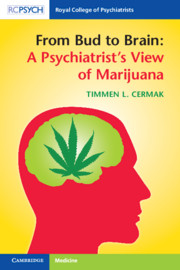Book contents
- From Bud to Brain: A Psychiatrist’s View of Marijuana
- From Bud to Brain: A Psychiatrist’s View of Marijuana
- Copyright page
- Dedication
- Contents
- Foreword
- Acknowledgments
- Introduction
- Section 1 The Science of Marijuana and the Brain
- Chapter 1 Monumental Marijuana Discoveries
- Chapter 2 Marijuana’s Acute Effects
- Chapter 3 Flies in the Ointment
- Chapter 4 Epidemiology
- Chapter 5 The Impacts of Ongoing Marijuana Use on the Brain
- Chapter 6 The Impacts of Ongoing Marijuana Use on the Mind: Section 1
- Chapter 7 The Impacts of Ongoing Marijuana Use on the Mind: Section 2
- Chapter 8 The Impacts of Ongoing Marijuana Use on Adolescent Psychology
- Chapter 9 Secondhand Marijuana: Prenatal Cannabis Exposure
- Section 2 The Science and Art of Healing
- Section 3 The History and Art of Marijuana Policy
- Section 4 Epilogue
- Index
Chapter 6 - The Impacts of Ongoing Marijuana Use on the Mind: Section 1
Memory, Executive Functions, Risk Assessment, and Impulsivity
from Section 1 - The Science of Marijuana and the Brain
Published online by Cambridge University Press: 31 March 2020
- From Bud to Brain: A Psychiatrist’s View of Marijuana
- From Bud to Brain: A Psychiatrist’s View of Marijuana
- Copyright page
- Dedication
- Contents
- Foreword
- Acknowledgments
- Introduction
- Section 1 The Science of Marijuana and the Brain
- Chapter 1 Monumental Marijuana Discoveries
- Chapter 2 Marijuana’s Acute Effects
- Chapter 3 Flies in the Ointment
- Chapter 4 Epidemiology
- Chapter 5 The Impacts of Ongoing Marijuana Use on the Brain
- Chapter 6 The Impacts of Ongoing Marijuana Use on the Mind: Section 1
- Chapter 7 The Impacts of Ongoing Marijuana Use on the Mind: Section 2
- Chapter 8 The Impacts of Ongoing Marijuana Use on Adolescent Psychology
- Chapter 9 Secondhand Marijuana: Prenatal Cannabis Exposure
- Section 2 The Science and Art of Healing
- Section 3 The History and Art of Marijuana Policy
- Section 4 Epilogue
- Index
Summary
Chronic marijuana use impacts an individual’s mind beyond the period of acute intoxication. Persistent downregulation of cannabinoid receptors in the hippocampus and frontal cortex alters cognition in a variety of ways, including memory, executive functions, risk assessment and impulsivity. Decrements in memory are the most consistent and well documented finding. Sensitive neurocognitive testing demonstrates impaired memory and learning worsen with increasing years of regular marijuana use. Pragmatic effects of reduced memory on daily life are measurable. Use as infrequent as once weekly diminishes memory in adolescents under 16. Higher order cognitive functions, including abstract thinking, planning, set shifting, sustained attention and judgement, are all diminished and persist in adolescents after a month of abstinence. The Dunedin study found cognitive deficits can be permanent with onset of marijuana use in early adolescence. Response inhibition in go/no-go tests is reduced with recruitment of wider areas of cortex than required by non-users and lessened awareness of errors, which reduces the ability to learn from mistakes. Scores on the Iowa Gambling Task are reduced, with a bias toward gains versus losses, which reduces judgment of risk.
Keywords
- Type
- Chapter
- Information
- From Bud to Brain: A Psychiatrist's View of Marijuana , pp. 72 - 96Publisher: Cambridge University PressPrint publication year: 2020

